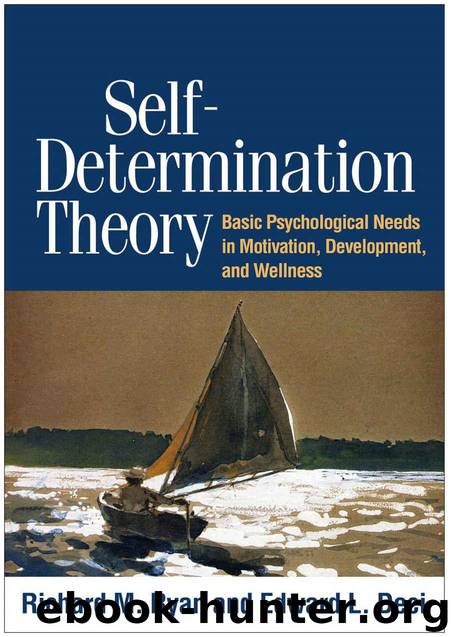Self-Determination Theory by Ryan Richard M. & Deci Edward L

Author:Ryan, Richard M. & Deci, Edward L. [Ryan, Richard M.]
Language: eng
Format: azw3
ISBN: 9781462528783
Publisher: Guilford Publications
Published: 2017-02-01T16:00:00+00:00
DUALISTIC MODEL OF PASSION
People often have strong interests or passions in their lives that are important identities and that centrally define them. In formulating a model of passion, Vallerand and colleagues (e.g., Vallerand, 2010, 2015; Vallerand & Houlfort, 2003; Vallerand, Rousseau, Grouzet, Dumais, Grenier, & Blanchard, 2006) began by examining activities (e.g., golf, gambling, video gaming) for which people were highly intrinsically motivated and thus engaged in the activities frequently and came to see them as passions. The researchers believed that different people had different types of relations with their passions, such that, for example, some people just could not stop doing the activity even if it would in some way harm them to continue, whereas others could be frequently engaged yet also able to stop when appropriate. For some people, it seemed like their self-worth required them to keep at their passions, trying to perform well, whereas for the others the activity was more an area of satisfactions than pressures.
All of these passions seemed to involve a mix of intrinsic interests and extrinsically based regulations, especially as people pursued the passions deeply. But, whereas some of the passions appeared to be identities that were well integrated, such that the behaviors involved were highly autonomous and need fulfilling, other of the passions seemed to be identities that came to control the people, rather than the people controlling the passions. In these latter cases, people tended to be driven by introjections and compulsions to pursue these central life passions.
In the dualistic model of passion, Vallerand (2015) specified that the passions that involve people being intrinsically motivated for an activity but having its regulation be introjected represent a relatively maladaptive relation to the activity, because they are engaging in it in a controlled and obsessive way. On the other hand, the passions that involve intrinsic motivation for the activity along with integrated regulation of it are much more adaptive because the person is engaging in it more autonomously and harmoniously. Accordingly, Vallerand (2015) specified obsessive passions as those that involve high intrinsic interest with their regulations being controlled and harmonious passions as those that entail a high degree of intrinsic motivation and interest but that are well integrated with other aspects of the people’s lives. Thus obsessive passions originate from and are in part regulated by intra- and interpersonal pressures and self-esteem-related contingencies, so someone experiencing an obsessive passion would likely feel compelled and ego involved to engage in the activity. In contrast, harmonious passions are undergirded by a fuller, less conflicted internalization so the activity is experienced as highly volitional, and, when it is engaged in, there is a sense of choice and vitality (Vallerand, 2015).
Some evidence suggests, in fact, that obsessive passion is often fueled by a compensatory motivation for need thwarting in other domains of life. That is, a person who has need frustrations may turn addictively to an activity in which intrinsic satisfaction can be or has been found. For example, Lalande et al. (2017) investigated psychological need satisfaction in four studies both inside and outside of people’s self-identified passions.
Download
This site does not store any files on its server. We only index and link to content provided by other sites. Please contact the content providers to delete copyright contents if any and email us, we'll remove relevant links or contents immediately.
Rewire Your Anxious Brain by Catherine M. Pittman(18628)
Talking to Strangers by Malcolm Gladwell(13335)
The Art of Thinking Clearly by Rolf Dobelli(10399)
Mindhunter: Inside the FBI's Elite Serial Crime Unit by John E. Douglas & Mark Olshaker(9305)
Becoming Supernatural by Dr. Joe Dispenza(8190)
Change Your Questions, Change Your Life by Marilee Adams(7724)
Nudge - Improving Decisions about Health, Wealth, and Happiness by Thaler Sunstein(7684)
The Road Less Traveled by M. Scott Peck(7578)
The Lost Art of Listening by Michael P. Nichols(7483)
Mastermind: How to Think Like Sherlock Holmes by Maria Konnikova(7309)
Enlightenment Now: The Case for Reason, Science, Humanism, and Progress by Steven Pinker(7300)
Win Bigly by Scott Adams(7178)
The Way of Zen by Alan W. Watts(6584)
Daring Greatly by Brene Brown(6494)
Big Magic: Creative Living Beyond Fear by Elizabeth Gilbert(5731)
Grit by Angela Duckworth(5588)
Ego Is the Enemy by Ryan Holiday(5399)
Men In Love by Nancy Friday(5223)
The Laws of Human Nature by Robert Greene(5144)
